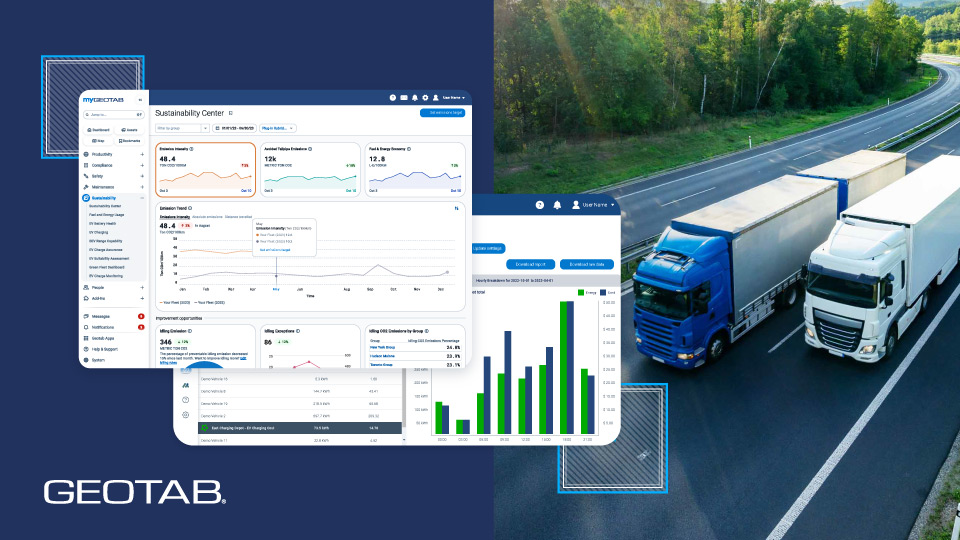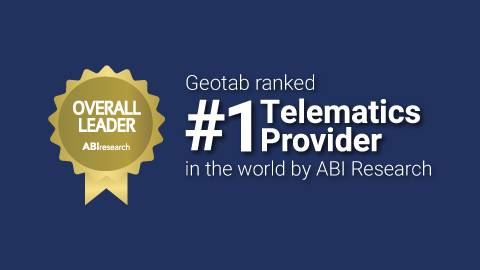
Geotab launches new tool to help fleets go electric
Published on January 15, 2020
Electric Vehicle Suitability Assessment tool uses Geotab telematics platform to deliver data-driven recommendations

Geotab Connect 2020 - San Diego, CA - January 15, 2020 - Geotab, a global leader in IoT and connected transportation, today announced the North American launch of its Electric Vehicle Suitability Assessment (EVSA) tool. Specifically designed to enable fleets to go electric, the EVSA helps fleet managers determine electric vehicle suitability by analyzing their existing telematics data and creating an electrification recommendation based on each vehicle’s distinctive driving patterns.
Announced at Geotab Connect 2020, Geotab’s EVSA solution identifies which electric vehicles meet range requirements, make the most financial sense and will ultimately help make electrification as seamless as possible for fleets. Based on telematics data, fleets are provided with a report which provides: lifetime cost and financial analysis, range assurance with best fit analysis and an environmental impact analysis that calculates fuel and CO2 emissions reductions.
“The Electric Vehicle Suitability Assessment evaluates your current fleet and creates a multi-year procurement plan to help you electrify it,” said Matt Stevens, Vice President of Electric Vehicles at Geotab. “The EVSA provides all of the information required to help ensure you are putting the best-fit electric vehicles into your fleet — so you don’t end up adopting a vehicle that does not work for you.”
Geotab’s EVSA solution is available as a free Add-In on the Geotab Marketplace, a robust and growing portfolio of mobile apps, software Add-Ins and hardware Add-Ons that enable Geotab customers to better manage their fleets. Used by companies with fleets large and small, the Marketplace offers over 200 third-party solutions to more than 40,000 Geotab customers, further solidifying the company’s leadership in commercial telematics.
“Geotab is the world's leading telematics platform for electric vehicles,” said Geotab CEO Neil Cawse. “The EVSA is a practical step in speeding up the commercial adoption of EVs and is going to help change the lives of fleet managers who are interested in the effective electrification of their fleets. Geotab goes even one step further and supports fleets on their journey from zero to 100 percent electric, offering a comprehensive suite of EV performance monitoring tools inside MyGeotab once a fleet has started to electrify.”
Post Tags
Media Contact
Nicole Riddle
Senior Specialist, Strategic Communications
pr@geotab.com
About Geotab
Geotab is a global leader in connected vehicle and asset solutions, empowering fleet efficiency and management. We leverage advanced data analytics and AI to transform fleet performance, safety, and sustainability, reducing cost and driving efficiency. Backed by top data scientists and engineers, we serve over 55,000 global customers, processing 80 billion data points daily from more than 4.7 million vehicle subscriptions. Geotab is trusted by Fortune 500 organisations, mid-sized fleets, and the largest public sector fleets in the world, including the US Federal Government. Committed to data security and privacy, we hold FIPS 140-3 and FedRAMP authorisations. Our open platform, ecosystem of outstanding partners, and Marketplace deliver hundreds of fleet-ready third-party solutions. This year, we're celebrating 25 years of innovation. Learn more at www.geotab.com/apac, and follow us on LinkedIn or visit our blog.
Related posts

Geotab Releases 2024 Sustainability and Impact Report: Profitable Sustainability
March 26, 2025
.jpg)
Driver Risk Insights in Geotab Safety Center Help Fleets Prevent Collisions
February 26, 2025

Geotab Announces Sustainability Center and EV Charge Monitoring for Improved Fleet Efficiency and Energy Cost Control
February 26, 2025
Recent News

Geotab Releases 2024 Sustainability and Impact Report: Profitable Sustainability
March 26, 2025

ABI Research Ranks Geotab #1 Global Commercial Telematics Vendor for Fourth Consecutive Year
February 27, 2025
.jpg)
Driver Risk Insights in Geotab Safety Center Help Fleets Prevent Collisions
February 26, 2025

Geotab Announces Sustainability Center and EV Charge Monitoring for Improved Fleet Efficiency and Energy Cost Control
February 26, 2025
